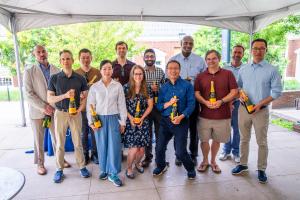About
Systems Engineering - Making Decisions Under Uncertainty & Solving Complex Problems
The Engineering School’s Department of Systems and Information Engineering (SIE) at the University of Virginia (UVA) was founded in 1976. SIE is now home to more than 30 full-time and joint-appointed faculty members with active teaching and research programs.
We offer an accredited undergraduate degree: the Bachelor of Science (B.S.) in Systems Engineering (SE). We also offer two master’s degrees: the Master of Science (M.S.; with thesis) and Master of Engineering (M.E.; non-thesis). Finally, we also offer the Doctor of Philosophy (Ph.D.) degree in Systems Engineering. SIE graduate students play a critical role in our department’s research, teaching and service mission, partnering with faculty and staff to deliver excellence in education and discovery. We believe that a better future is possible for all by training the leaders of tomorrow in a collaborative academic environment that encourages excellence in the classroom and laboratory.
Systems and Information Engineering Vision Statement
Systems engineering is the scientific discipline focused on designing, analyzing, and improving complex human/technology/software systems that range from delivering information to multi-person sociotechnology systems to positively impact human well-being and society at large. We adopt systems thinking to make sense of the complexity of the world to tackle societal challenges.
Specifically, the Systems and Information Engineering Department here at the University of Virginia aims to advance the methods, frameworks, science, and/or technology in three domains:
- Human Technology Interaction - this involves the application of scientific principles, methods, and data drawn from a variety of disciplines to the design and development of engineering systems to facilitate the interaction between humans (the users) and technology.
- Information and Intelligent Automation - this focuses on smart, intelligent, and automated technology and method development that explores innovative ways these intelligent systems can improve society.
- Operations Research and Analytics - this focuses on the development and application of analytical methods to improve decision-making by employing techniques such as modeling, statistics, and optimization to arrive at optimal or near-optimal solutions to decision-making problems.




